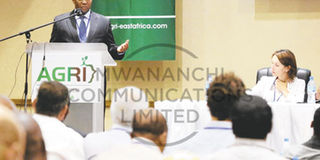We’ll work on nuisance taxes in agriculture, promises govt

The permanent secretary in the Ministry of Agriculture, Livestock and Fisheries, Dr Florens Turuka, delivers a speech at the opening of the Agri-business East Africa congress in Dar es Salaam yesterday. PHOTO|VENANCE NESTORY
What you need to know:
The permanent secretary in the Ministry of Agriculture, Livestock and Fisheries, Dr Florens Turuka, told an ongoing Agri-business East Africa congress yesterday that the government was working on the proposals that will be submitted to the Budget task force for review.
Dar es Salaam. The government has welcomed proposals on the taxes the private sector thinks should be removed to unleash the potential growth of agriculture.
The permanent secretary in the Ministry of Agriculture, Livestock and Fisheries, Dr Florens Turuka, told an ongoing Agri-business East Africa congress yesterday that the government was working on the proposals that will be submitted to the Budget task force for review.
However, he did not say which specific taxes the government was planning to remove.
The two-day congress which started yesterday attracted 45 international companies which displayed agricultural equipment here.
“Tax issues are ongoing and we are telling stakeholders to bring their suggestions on the agriculture taxes that are not necessary,” said Dr Turuka.
He said Tanzania’s agriculture which employs about 75 per cent of the workforce and contributes 25 per cent to the gross domestic product (GDP) was still dominated by smallholder farmers who also need to be treated as investors.
Agricultural Council of Tanzania chairman Sinare Yusuf Sinare, said they were concerned with the produce cess which is charged by local authorities at five per cent of the gross produce; and the value-added tax (VAT) on products like packaging equipment.
“These are unnecessary taxes and we are talking with the Ministry of Agriculture so that they can be submitted to the Tax Review Taskforce for consideration. The produce cess is charged whether a farmer produced at a loss or profit and sometimes it is so poorly administered that one farmer can pay up to three times provided they cross more than one local authority,” said Dr Sinare.
He said charging VAT in packaging materials for farm produce was watering down efforts to make local products more competitive. He called upon the government to ensure a conducive business environment for agriculture.
“If you go to a supermarket in Kenya, you will find milk from South Africa, Rwanda and even Uganda but not from Tanzania. May be it’s expensive. The only way to make it competitive is reducing taxes.” Dr Sinare said even the efforts by the government to subsidise agricultural inputs were neutralised by high and numerous taxes.
However, a policy adviser to the Ministry of Agriculture, Dr David Nyange, said the future of Tanzania’s agriculture was promising.




